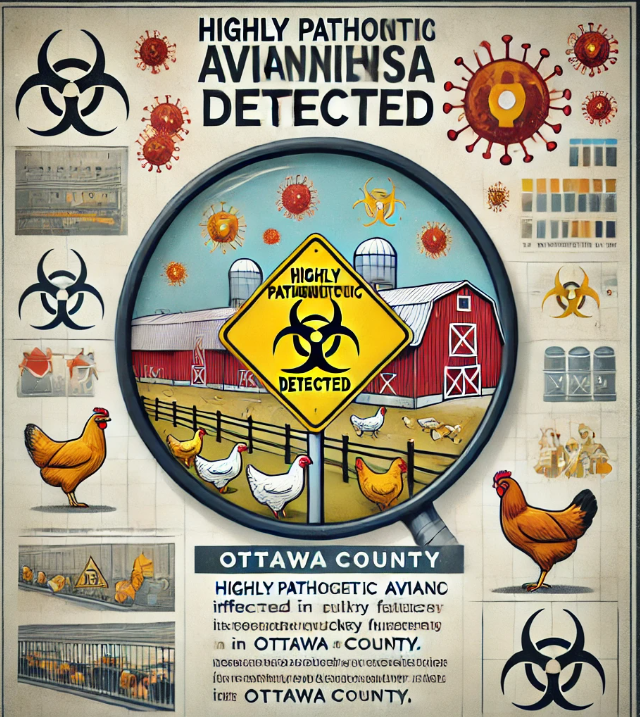The Michigan Department of Agriculture and Rural Development (MDARD) has confirmed a case of highly pathogenic avian influenza (HPAI) in a commercial poultry operation located in Ottawa County, Michigan.
Highly Pathogenic Avian Influenza Found in Ottawa County Poultry Facility

LANSING, Mich. — This is the first reported case of HPAI in a commercial flock in Michigan since May 2024, according to an investigation by MDARD. The Michigan State University Veterinary Diagnostic Laboratory identified the presence of the virus in the Ottawa County poultry flock.
The facility’s name and ownership were not disclosed by MDARD, but officials noted that this is the second instance of the virus affecting a commercial poultry site in Ottawa County since its initial detection in Michigan in 2022.
Protecting Public Health and Containing the Virus
“Protecting human health and minimizing the spread of HPAI remains a top priority,” said MDARD Director Tim Boring. “Enhancing on-farm biosecurity measures and broadening HPAI surveillance are critical steps to safeguard domestic animals and reduce any potential threat to humans.”
HPAI is a highly contagious virus that spreads rapidly among birds through direct contact, contaminated equipment, wild birds, and even on the clothing of workers.
To contain the outbreak, MDARD placed the affected poultry facility under strict quarantine. Additionally, all birds within the facility will be humanely depopulated to stop further spread of the virus.
Worker Safety and Human Health
Dr. Natasha Bagdasarian, Michigan’s chief medical executive, emphasized the importance of protective measures for farm workers.
“Because this virus can affect both animals and the people who care for them, it’s essential that farm workers continue to use personal protective equipment (PPE). These precautions are crucial to protect individuals, their families, and to prevent potential animal-to-human transmission,” she said.
The Centers for Disease Control and Prevention (CDC) assures the public that the risk of HPAI to human health remains low. No poultry products from infected birds will enter the food supply chain, ensuring food safety for consumers.
Preventive Measures for Poultry Owners
MDARD urges poultry owners to implement biosecurity practices to protect their flocks from HPAI. These steps include:
- Limit exposure to wild birds: Bring domestic birds indoors or use secure, enclosed outdoor areas.
- Practice hygiene: Wash hands thoroughly before and after handling birds or moving between coops.
- Disinfect equipment and clothing: Clean boots, gear, and tools when transitioning between coops. Discard items that cannot be properly disinfected.
- Avoid sharing equipment: Do not share supplies between farms or coops.
- Use clean water sources: Provide birds with municipal or well water for drinking.
- Protect poultry feed: Store feed securely to prevent contact with wild birds or rodents.
Reporting Suspected Cases
Poultry owners who suspect HPAI in their birds should contact MDARD immediately:
- Daytime: 800-292-3939
- After hours: 517-373-0440
For wild bird cases, reports can be submitted through the DNR Eyes in the Field app or by calling the DNR Wildlife Disease Laboratory at 517-336-5030.
By following these protocols, poultry owners and farm workers can help minimize the spread of avian influenza and protect both animal and public health in Michigan.









cer0in
6eduxg
462mcz
xmdr36
2vb6fn
95pxo7
Your article helped me a lot, is there any more related content? Thanks!
Thank you for your sharing. I am worried that I lack creative ideas. It is your article that makes me full of hope. Thank you. But, I have a question, can you help me? https://www.binance.com/cs/join?ref=S5H7X3LP
Can you be more specific about the content of your article? After reading it, I still have some doubts. Hope you can help me.
rg0g0x
Thanks for sharing. I read many of your blog posts, cool, your blog is very good.
n458z6
80j1q7
Your article helped me a lot, is there any more related content? Thanks!
Can you be more specific about the content of your article? After reading it, I still have some doubts. Hope you can help me.
Can you be more specific about the content of your article? After reading it, I still have some doubts. Hope you can help me. https://accounts.binance.com/ES_la/register?ref=T7KCZASX
Can you be more specific about the content of your article? After reading it, I still have some doubts. Hope you can help me. https://www.binance.com/uk-UA/register?ref=W0BCQMF1
I don’t think the title of your article matches the content lol. Just kidding, mainly because I had some doubts after reading the article.
tue1ip
Your point of view caught my eye and was very interesting. Thanks. I have a question for you.
Thank you for your sharing. I am worried that I lack creative ideas. It is your article that makes me full of hope. Thank you. But, I have a question, can you help me?
8p4fuc
I don’t think the title of your article matches the content lol. Just kidding, mainly because I had some doubts after reading the article.
tzj2fw
Thank you for your sharing. I am worried that I lack creative ideas. It is your article that makes me full of hope. Thank you. But, I have a question, can you help me?
I don’t think the title of your article matches the content lol. Just kidding, mainly because I had some doubts after reading the article.
s8s1ct
Thank you, your article surprised me, there is such an excellent point of view. Thank you for sharing, I learned a lot.
j1mypo
Good shout.
Nice
Nice
8sv8z6
thcv gummies area 52
thca carts area 52
disposable weed pen area 52
full spectrum cbd gummies area 52
best cbd sleep edibles area 52
thc gummies
distillate carts area 52
thca products area 52
buy magic mushrooms area 52
liquid diamonds area 52
liquid thc area 52
best indica thc weed pens area 52
thc gummies for pain area 52
thca diamonds area 52
indica gummies area 52
snow caps thca area 52
mood gummies area 52
microdose thc area 52
live rosin gummies area 52
hybrid gummies area 52
thc gummies for sleep area 52
live resin area 52
weed vape area 52
sativa gummies area 52
thc gummies for anxiety area 52
thc tinctures area 52
best sativa thc carts area 52
1 gram carts area 52
GU
UU
I don’t think the title of your article matches the content lol. Just kidding, mainly because I had some doubts after reading the article.
0lh85t
x12aho
1mo06i
40ce08
sgrtfo
bp7yy8
Thank you for your sharing. I am worried that I lack creative ideas. It is your article that makes me full of hope. Thank you. But, I have a question, can you help me?
ppgxlm
Thank you for your sharing. I am worried that I lack creative ideas. It is your article that makes me full of hope. Thank you. But, I have a question, can you help me?
Your point of view caught my eye and was very interesting. Thanks. I have a question for you.
Can you be more specific about the content of your article? After reading it, I still have some doubts. Hope you can help me.
n8wo21
Your point of view caught my eye and was very interesting. Thanks. I have a question for you.
I don’t think the title of your article matches the content lol. Just kidding, mainly because I had some doubts after reading the article.
6c7nuf
zzaumk
mc20mo